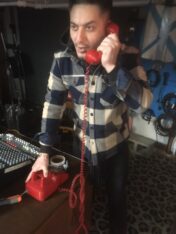Source: Instagram/@victoraxelrod
We asked Victor Axelrod and he answered
The producer and keyboardist gives a song-by-song breakdown of the new Daptone reggae comp ‘If You Ask Me To’

Axelrod (Photo by MSparklestein, CC BY-SA 4.0)
In music, as in life, records are made in a sort of domino effect. One project often leads to another.
Such is the case for Victor Axelrod, a keyboardist, producer, arranger and mixing engineer who has been involved with New York’s reggae, soul and Afrobeat scenes for decades. A selection of his reggae productions made for Daptone Records, titled “If You Ask Me To: Victor Axelrod Productions for Daptone Records” has just come out, providing a nice summation of his career to date.
“[The title] seemed to connect a bit to how this all came about, which was [that] one request leads to the next request,” Axelrod says from his home in Gowanus. “Eventually, we’ll have enough of these [songs] and we’ll have a nice album.”
Axelrod has been producing reggae and rocksteady interpretations of soul songs for Daptone for over a decade, though his work behind the board goes back much further. Often under the moniker Ticklah, Axelrod has produced records for Easy Star Records, Queens-based reggae group the Frightnrs, and his own releases including the dubby “Ticklah vs. Axelrod.”
An equally accomplished musician, Axelrod is a founding member of Antibalas and Daptone’s house band, the Dap-Kings. Among his many credits, Axelrod’s keys appear on Amy Winehouse’s “Back To Black” (which was recorded at Daptone’s Bushwick studio) and multiple Mark Ronson productions.
Although he had been associated with the label since its beginnings, it would be years before Axelrod produced tunes for Daptone. Yet once the faucet was turned on, it never went off again. Much of “If You Ask Me To” was recorded with the same crew of local musicians — often credited as the Inversions — all of whom were “showing up and really being down to explore my ideas and wait for other good ideas to arise,” Axelrod says.
For his first LP on the label, Axelrod decided to use his given name, rather than Ticklah. The choice was partially to align with Daptone’s aesthetic, and partially the desire to step away from what felt like a 1990s alias.
“I’ve been on this classic rocksteady journey with the label, and thought it would be good to keep that effort all contained within one record,” he notes.
In honor of the release of “If You Ask Me To,” the Brooklyn native shares the stories behind each of the album’s 10 tracks.
Sugar Minott: ‘One Step Ahead’
I’d recorded [legendary reggae singer and soundsystem operator] Sugar at my place once before in 2008, [on] “Praise His Name” on Liondub45. He’d kept my phone number, and the next time he was in town later that year, let me and all other producers in the area know he was around and down to work.
I’ve always loved his version of “A House Is Not A Home” and wanted to try covering another song from the mid ’60s with him. As far as I could tell at the time, no one else had covered “One Step Ahead” in reggae or rocksteady. I ran the idea by him over the phone, and he was game.
There wasn’t time for me to come up with a thorough arrangement or get musicians together to record a track for it, so I made a quick midi demo for him to sing over.
We cut the rhythm track for this at the same session as “I Can Be Cool.” It wasn’t until the pandemic that I had the clarity to finally put this one to bed after finishing the “Always” album for the Frightnrs.
Leon Dinero: ‘If You Ask Me To’
I like keeping [Leon Dinero’s identity] a little murky. But there are people who are familiar enough with his voice to just be like, “Wait, that kind of sounds like Screechy Dan.” [Leon Dinero is, in fact, an alias of singer Robert Stephens, who performs as Screechy Dan.]
“If You Asked Me To” was recorded at the same session as the other songs for [the Frightnrs’ 2016 album] “Nothing More To Say.” I don’t know that that song would have made that album anyway, but I do have Dan [Klein, the Frightnrs’ late vocalist and the song’s writer who died from ALS in 2016] singing it. That song was the last thing Dan attempted to sing at my place.
He tried so hard on all of those songs and it was just so exhausting for him to make it work. Thankfully, with all of the other songs we had very usable takes that came together. But it was also excruciating at times being witness to what he had to go through to actually get those performances out of his mouth. The whole thing was very painful. From that point, he just didn’t have any more gas in the tank to come over [and record for “Nothing More To Say”].
Dan was such a fan of Screechy; he would be psyched to have Screechy sing one of his songs.
Charles Bradley : ‘Whatcha Doing (to Me)’
I wrote that song for Charles based on conversations I’d had with him. He would talk to me about the two-faced people he would have to deal with, that he’d known for a long time who wanted things from him. He felt that people were angling, trying to get something out of him.
That was the only time I’ve ever had that writer’s experience where an idea just appears in your head. That pretty much never happens with me, but I just woke up with that hook one day. Then later, I wrote more after hanging with Charles a lot. I realized that the chorus idea was completely in line with all of these things that Charles talked about.
The original version of that song was on Charles’ album [“Changes”] under the title “You Think I Don’t Know (But I Know).” I took his vocal tracks and the background vocal tracks, and [built] my version around that. I wrote that song with Tom [Brenneck]; he helped me finish it.
Charles got to hear the song; he had been touring the soul version. By the time the reggae version came out, he was already close [to dying]. Somebody played it for him in the hospital, and the report was that he loved it! We’d gotten into a conversation a few years prior where he told me he wanted to make a “soulful reggae record.”
Bob & Gene: ‘I Can Be Cool’
I did a tape transfer for Daptone, where they gave me some Bob and Gene multitracks including “I Can’t Stand These Lonely Nights” and “I Can Be Cool” — there’s another one I think called “Sailing,” and then there was “It’s Not What You Know (It’s Who You Know).” I had these original vocal stems and this loose idea of, maybe I can do remixes with these great vocal performances.
For a lot of these, I had my arrangement notions, which the guys were patient enough to learn and get into the weeds with. These songs have a lot of different sections — especially a song like “I Can Be Cool.” There’s plenty of reggae that might not have as many parts.
[When we get into the studio,] there’s a degree of apparent ideas, and then there’s usually some things which happen spontaneously. I might have had an idea about how the bassline would go; maybe I’d have a vague idea of what the guitar should be doing. But the beauty of working with somebody like Tom Brenneck is that I can simply have a notion, and from there he can eventually stumble into a really great idea.
When we cut the track, I had already had the vocals for two years. I had already tried to record that and track with a few different musicians, and it just wasn’t working. This one has Tommy on lead guitar, Brett Tubin on rhythm guitar, Rich [Terrana on drums] and Preet [Patel on bass] from the Frightnrs.
I wasn’t planning on putting horns on that one, but then I just started hearing it in my head. I wrote very specific horn arrangements for that and used the Dap-Kings horn section [of Neal Sugarman, Dave Guy and Cochemea Gastelum] on that.
Binky Griptite: ‘Lover Like Me’
“Lover Like Me” is a song written by Gabe and Neal that goes way back; there’s a version of that song by Lee Fields on an old Daptone or Desco 45. There might even be a Sharon [Jones] version.
I feel like it’s always been around, and I always just heard a sort of swing arrangement under it. I had the idea to do it in a minor key as well; I tried putting Binky’s vocals on the minor version and for whatever reason, that just did not sit right. Later, we did a ’60s style ska version with Leon Dinero.
The Frightnrs: ‘I’d Rather Go Blind’
I had already been working with the Frightnrs for a couple of years. I’d been working all year on the music that ended up being on the EP “Inna Lovers’ Quarrel” that came out on Mad Decent. One of the tracks that was going to be included on that EP was [a cover of Etta James’] “I’d Rather Go Blind.”
We had Tom Brenneck play a little bit of extra lead guitar on that one; and when I had finished mixing that track, I sent it to him. His response was, “You gotta let Gabe and Neal hear this.” I was very skeptical; I had shared earlier Frightnrs music I’d produced with Gabe in the past, and he had never responded to my emails. I wasn’t even showing it to him to be like, “Hey, you might be interested in putting out this band.” I didn’t take it personally though, he’s a busy guy.
Eventually there was some house party where Tom dragged Neal into a room and had him listen to it. They shared it with Gabe, and then the following Monday Gabe is now calling me to say, “Hey, we heard that Frightnrs song. We want to put that out.”
But what happened in the course of that same phone call was that he went from telling me he wants to put out “I’d Rather Go Blind” to “Hey, you got a good thing going on with those guys… we’ve been trying to figure out a way for you to get a whole album happening. Why don’t you make an album with those guys?”
[The Frightnrs] play rocksteady, but they are much more than that. If you listened to “Inna Lover’s Quarrel” and “Always,” that [later ’70s and ’80s era reggae sound is] definitely more of their vibe. That’s not to say that “Nothing More to Say” is a lie or anything like that; it was an album that was made with this idea of making a very classic-sounding record right that sort of suits the personality of this record label that we all love.
I was wondering if Dan [Klein] would get a little self-conscious about [covering Etta James]; when it was time to record that particular song he did not falter at all. We recorded two takes, and both were amazing. I probably used most of one take and chopped a bit from another one. What he did with that song was impressive to say the least.
As many times as I’ve heard it, that one still shakes me.
Bob & Gene: ‘I Can’t Stand These Lonely Nights’
“I Can’t Stand These Lonely Nights” is maybe the simplest of all of these in terms of the song structure; maybe it’s the least ambitious. But it worked.
The rhythm section on that is different than the rest of the album. The rhythm section is Eddie O’Campo and Victor Rice. There was a window there where I was recording them a lot; those two are on the few things on the “Ticklah vs. Axelrod” album.
I had recorded just bass and drums with those guys in my place, and then I overdubbed Delroy Franklin and Tom on guitars.
Bob & Gene ‘It’s Not What You Know (It’s Who You Know)’
The chords are more or less following the original [soul recording by Bob & Gene] but there’s a few subtle changes. I had reharmonized the sections a bit; I think I used more major key, prettier chords in the verses and then went back to the more minor field in the choruses. Whereas like on the original version of the song, it just stays on the same chords the whole time.
We had a very big and beautiful intro, and then we just did what we did at the session. Whatever it is that Tom plays on the intro, he’s referencing something that they do in the vocals.
If you listen to the intro on “Lonely Nights,” I’m playing this long ascending piano octave over the course of however many measures. Years later, we cut “It’s Not What You Know,” and I ended up playing this long descending octave figure. In the moment, I wasn’t trying to be cute when I did that. It was only later that I realized that I sort of did these mirroring conceptual octaves.
As far as the performance goes, it’s just the musicians playing great and being patient. Like me being patient with them, them being patient with me – patience all around. [Laughs.] They have to learn how I’m thinking about it, and then we have to play it a bunch; we’re usually doing this in one evening.
Sharon Jones: ‘How Long Do I Have to Wait for You’
I’d never produced anything for the label until this Sharon Jones remix of “How Long Do I Have To Wait For You?” I had been producing on my own plenty.
The car company Scion made a “Daptone Remixed” compilation CD in [2007]. And Gabe and Neal were asking me for DJ Spinna’s number — I think they were asking me for advice, Like, “Who should we get to remix?” And it was funny because I didn’t want to say, “Why aren’t you asking me?”
Eventually though Neal came to me to say, “We don’t have much time left and the budget’s pretty much gone, but would you be down to do a remix?” So I got into the Sharon Jones remix, and the people at the label loved it. And that’s always the thing with those guys: They want to love what they put out.
And that’s really what opened the door of my relationship with them as a producer — even though I had been a part of things connected to Daptone from the very beginning.
I never thought that they would look to me to produce anything for their label. I don’t think they ever thought oh yeah, we should put out reggae things or reggae-related things, but at that point in time they loved what I did. And the 45 itself was selling well. So then that brings up the subject of, “Let’s figure out a way to do more records that would still suit the personality of the label.”
The Inversions: ‘Conscience is Heavy’
It’s pretty much the same Inversions lineup: Preet and Rich from the Frightnrs, Brett Tubin on rhythm guitar, Tom Brenneck on lead guitar; I overdubbed Anant [Pradhan] on saxophone. I really love how the band plays on that one. Gabe recorded me over at Daptone playing organ.
Sometimes [creating these songs is] more of a technical revelation. Like, “I could have done better with the mic placement on this one.” Or, “Man, we really nailed the mic placement.” With “Conscience Is Heavy,”/”Lover Like Me,” that was definitely [using] the least amount of microphones.
You might also like 


























